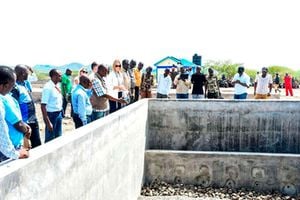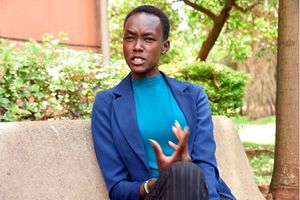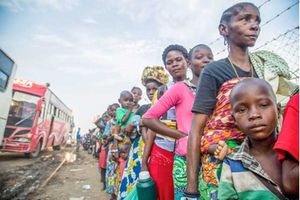
Displaced South Sudanese women walk towards the United Nations Mission in South Sudan base in Malakal. The South Sudanese community cites a plethora of woes including discrimination, language barriers, and mistreatment in the areas they live.
Bol Ajak Atem De Deng-Jhoong, the South Sudanese community chairperson in Nakuru county, vividly paints a picture of the struggles endured by the refugees.
He recounts a distressing incident last year where seven South Sudanese nationals, including a six-month-old baby, were arrested and detained despite possessing all the necessary refugee documents.
Lack of consideration for a six-month-old baby during the incident paints a grim picture of the challenges faced by these vulnerable populations.
“They were accused of being unlawfully in Kenya and police didn’t show any consideration and sympathy for a six-month-old baby,” said Mr Ajak.
He also recalls an unsettling event in October, when a church frequented by refugees for prayers was destroyed by unknown individuals.
“This not only disrupted a place of worship but also raises concerns about the denial of freedom of worship, a right protected by Article 32 of the Kenyan Constitution. This provision underscores the significance of spiritual sanctuaries as crucial hubs for community cohesion and religious expression and must be respected,” added Mr Ajak.
Another refugee Angok Peter Dengtiel cited challenges faced, including language barriers and discrimination when seeking basic services like medical care.
“Some of our parents don’t know Kiswahili or English and when they seek basic services like medical care and other social services they are discriminated against,” said Mr Angok.
However, he does express gratitude towards Kenyans for their hospitality and acknowledges the educational opportunities provided to their community.
“I have been in Kenya for more than 10 years and Kenya is like my second home. I love the hospitality of Kenyans. Our brothers and sisters have acquired education in Kenyan schools and some are in local and international universities pursuing their dreams,” said Mr Angok.
Nakuru county, a vibrant and cosmopolitan region in Kenya, plays host to one of the largest population of South Sudanese refugees in the country.
As of September 2023, UNHCR says about 95,000 refugees resided in Nairobi and other urban areas with close to 8,000 to 10,000 of these refugees finding a home in Nakuru.
The Kakuma refugee camp, along with its expansion site Kalobeyei settlement, stands as one of the largest South Sudanese refugee populations globally.
Yet, within this seemingly promising scenario, the plight of these refugees reveals a vulnerable and fragile reality.
A closer examination of their circumstances unveils a complexity of both fortunes and misfortunes.
Despite being born in Kenya and enjoying fundamental rights such as education, healthcare, and limited freedom of movement, concerns linger among some refugees regarding the challenges they grapple with.
Some South Sudanese refugees have met mysterious deaths, others face harassment and arrests by the police, often compelled to part with substantial bribes.
Their stateless situation worsens as specific refugee rights are violated by beatings, harassment, extortion, arbitrary arrests, and detention.
Makuei Junior Maluk Adhor refutes claims of South Sudanese refugees being the main cause of insecurity, emphasising that the majority are law-abiding individuals simply seeking refuge.
But a senior police officer denied the claims that South Sudanese refugees in Nakuru county were arrested arbitrarily.
“As refugees, it is essential for them to respect the laws and customs of the host country. These includes following local rules and regulations. Failure to do so can result in fines, penalties, or even legal trouble. They must respect the laws of the land to enjoy their stay in Kenya,” said the police boss who declined to be quoted as he is not the spokesperson of the county police commander.
Ibrahim Khalif, the legal officer at the Department of Refugees, reiterates the government's commitment to ensuring refugees receive relevant documents to access services.
Khalif encourages refugees to abide by the laws to avoid arrests and affirms ongoing sensitisation efforts with the police and Directorate of Criminal Investigations.
“The government is committed that the refugees are issued with all the relevant documents so that they can access services in the public and private sector. The government has sensitised the relevant bodies to ensure they recognise the refugees in their platforms,” said Mr Khalif.
“We facilitate the refugees to get Kenya Revenue Authority (KRA) pin to ensure they participate in the social economic wellbeing of the country by paying relevant taxes,” added Mr Khalif.
He urged refugees to abide by the laws to avoid being arrested by police and other security agencies.
However, he said his department was also sensitising the police and the DCI on the documents they should check when dealing with them as per the Refugee Act.
Jasline Dudu Wani, representing South Sudanese women, expresses concern about the prolonged integration process for refugees in Kenya while highlighting challenges in obtaining travel documents and the necessity of bribes to acquire legal documents.
“Getting travel documents to travel to Kakuma refugee camp is a big problem and sometimes we are forced to give bribes to get the authorising documents,” said Ms Dudu.
She said she has not been given the alien identification documents despite applying for them.
“Every time I apply for these documents I’m told the machine has broken down,” she lamented.
However, the majority of the host community is friendly and accommodates them.
“I’m the only refugee from South Sudan in the apartments I live in and I’m treated equally by the local community,” added Ms Dudu.
However, she points out discrepancies in medical treatment and highlights the death of Aldo Wool Agany, who passed away mysteriously after an accident which remains uninvestigated.
Justice for six refugees attacked and one killed in a house fire in 2022 is still pending, raising concerns about the lack of accountability.
“Our colleague was supposed to undergo surgery but died before the doctors moved in. We filed this case in 2022 but no action has been taken to open an inquiry that led to his death,” said Mr Ajak.
As if that is not enough, in 2012 a three-year-old child was kidnapped as the parents and 12 years later no one has been arrested.
“This heartbreaking incident is a stark reminder of the importance of Kenya upholding human rights for all,” added Mr Ajak.
Another incident is the kidnapping of a three-year-old child in 2012, which remains unresolved, and an attack resulting in the death of a young refugee in the same year. Despite an arrest, the suspect jumped bail and remains untraceable.
Such injustices depict the challenges South Sudanese refugees in Nakuru face in their pursuit of justice.
However, it's acknowledged that some refugees contribute to their misfortunes due to bad behaviour.
A refugee died in a clan fight, and another was killed in a mob attack after a scuffle in Nakuru’s White House area, with the circumstances of his death still unresolved.










